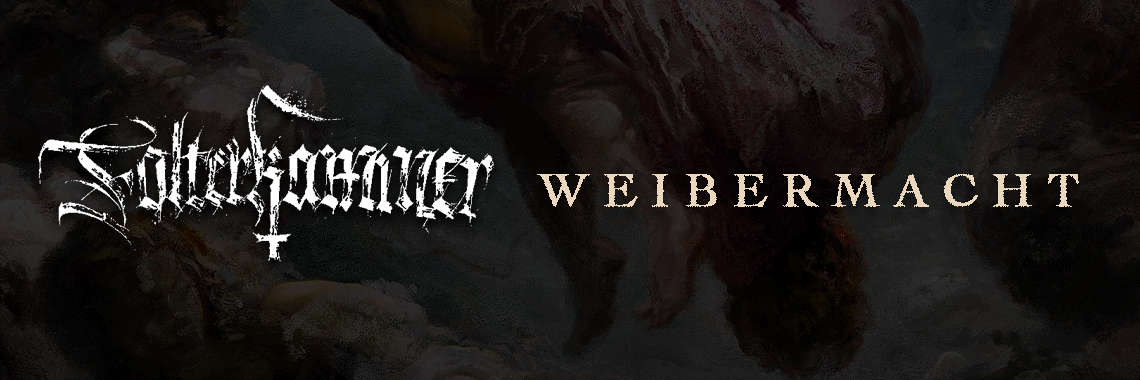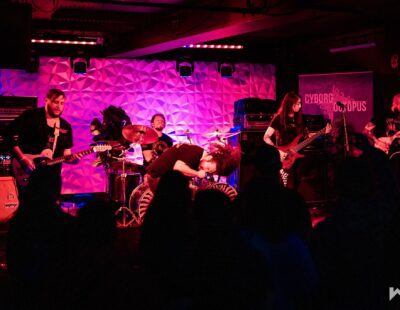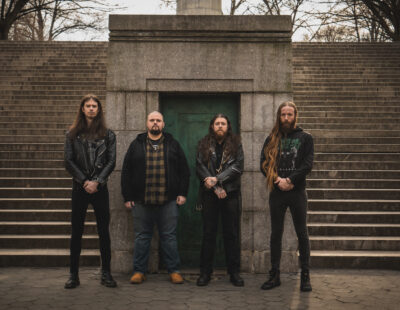Dragged into Sunlight are one of the most exciting things to happen to the UK underground metal scene since Anaal Nathrakh started experimenting with black metal’s forbidden fruits and spitting the pips through a particle accelerator. Mixing elements of doom, black and death metal with a horrible, uncodified ritualistic live/visual aesthetic, Dragged into Sunlight genuinely possess the power to discomfit and horrify. Their video for “Buried under Leeches”, available to download from their site here, didn’t meet with YouTube’s Ts&Cs, with the washed out noir footage of some guy getting tortured and destroyed in some sort of rite clearly ill-fitting in the social networking site’s complement of funny animal videos and fat kids doing karaoke rapping. Seriously though, it’s 100 per cent NSFW, and fits Dragged into Sunlight’s sound perfectly.
This interview’s quotes are unattributed to any individual, as is the band’s wont, but it was conducted with the singer just before their performance at Damnation. Their debut LP Hatred for Mankind is not to be slept on. Their single-track 40-minute Widowmaker will be released shortly through Mordgrimm, which will just have to tide you over in lieu of a new album
You’re all sworn to anonymity; is it a question of the whole being greater than the individual? You’re very protective over the chemistry of the band.
If we didn’t have the same group of people we wouldn’t be doing what we’re doing. If one person goes missing, we don’t know what we’re doing. Our head falls off. We all bring our individual aspect to it and if one of us was replaced by a different member I don’t know what we’d do. The chances are it wouldn’t work. There’s something about the same group, the same collective all intertwined in the same thing, in different projects, but when combined in Dragged into Sunlight it turns into a hideous sound that I couldn’t recreate with any other band. We’ve all been in other bands where we’ve been the hardest working members and really broke our balls for nine or 10 years, left the scene, left playing music, and left playing shows really bitter and pissed off. If you took those five members and put them in one band, a group of hideously angry people, then they’re going to do something hideously angry, which is what we’ve done. We don’t see each other for seven months at a time and by the time we get together to play a show we’re at breaking point—we don’t play that much.
You don’t play live that often, why is that?
I don’t think we could play any more shows than we do, just because, logistically, it doesn’t work. We’re based so far apart. We have so much going on; the most we can do is record and play a couple of shows. When we do play it’s 200 per cent and if we played every week maybe it wouldn’t be 200 per cent. We could easily become subdued and effortless. There is a limited amount of resource to work with in terms of where you’re getting your inspiration from and if you’re playing a show every week or every month, you’re going to wear out the inspiration and the band stops being fun and I always said that the day this band stops being enjoyable we won’t be doing it anymore. If we can stretch it out as long as possible, playing shows with bands we wanna see—that’s another important thing, we don’t congregate from across the UK to see someone that we don’t really care about; the bands that are playing today are the bands we love, bands we grew up listening to, and some of us are losing the plot at the thought of being on the same bill as Ulver or Godflesh, a band you never thought you’d see again.
It’s been a good few years since Hatred for Mankind came out, how has the scene in the UK changed since then?
It was 2009 it came out through Mordgrimm and then in 2011 Prosthetic re-released it. I guess the scene has been willing to do a lot more experimental things, and I guess it’s grown—certainly the experimental side of it, since we did this album. Now the album fits; it has other releases, other underground UK extreme metal releases, and we fit in a bit more. When we first started doing it back in 2009, there were a lot of experimental bands but not a lot of them were getting much attention. Now, I guess Hatred for Mankind fits into the scene, and it’s a diverse scene—you’ve got bands like Conan, bands like Astrohenge, and they’re all doing their own thing. Everybody knows each other; we see each other at the same shows, and I think that’s how it used to be a long time ago. You used to go to gigs and get a different band every hour, a different genre every hour, and it wasn’t just bands recreating their friends’ band where it’s like copying a tape a thousand times and gradually it’s going to crap out. At the moment we’ve got a really strong scene, and Dragged into Sunlight fits in a lot more than we used to.
The slew of metalcore rubbish has died down. There seem to be more bands taking care over their sound.
I think people are breaking the mold. There was a big surge of metalcore upon metalcore, just waves of bands who’d get so diminished [over time]. You’d get doom and then you’d get a sub-genre, then you’d get a sub-sub-genre, and eventually you’d end up somehow with deathcore/metalcore and they end up shitting it out like there’s no tomorrow. There are a lot of people in the midst of that, lapping up whatever the next craze is, the latest band on that wave—it’s similar to nu-metal, as you’ve got people lapping it up it just gets carried away, and in the midst of it people forget what a drum sounds like, people forget what it is to spend a lot of money on equipment and really take the time with their sound to make sure they’ve got good amps, good drums. No one cares: you go into a studio, you trigger it, and all of a sudden your drummer can blast at 250bpm, then you see them live, see so many bands live, and it’s a disappointment. You just want them to try a little harder and pay it a bit more respect because being in extreme metal—it’s been the last 10, 11 years of my life—and to see bands like Anaal Nathrakh and Medulla Nocte, around 2001/2002 when the scene was strong, and they’re still going and pushing it or coming back in Paul Catten’s case, and it’s really reassuring. It’s good to see.
The environment seems to be right for bands to reform now, too. We’re at Damnation where Godflesh are back and the interest in them has never been higher it seems.
It’s good to see. There are bands that are out there that are going to reform and do more shows—look at Sleep; they were dead for years and then they just revive it and there’s an entire audience for them. Now, for another ten years no one will forget about Sleep, for another 25 years no one will forget about them; they’re going to keep coming back. Godflesh as well, I saw them with Goatsnake and they were a massive inspiration, a great band and one I never thought I’d see live and I’ve seen them twice now. It’s really good that they’re back and playing and welcomed to a scene by music fans who still love that raw and authentic sound rather than studio-triggered nonsense. Those musicians, they’re great musicians but they need to sit down and work on their music, take some time…
When will we hear a new album?
We’re writing for another Prosthetic album. Hopefully that’s going to be recorded soon but first we’ve got Widowmaker which is in three installments, 40-minutes long, and I’d say it’s doom—there are influences from Eyehategod, Grief—but then there’s some thrashier elements, and there’s a bit of High on Fire, Trap Them, even Om in there too. Some of it reminds me of Iron Monkey; it’s a slower approach, a crustier approach, and it’s a homage to those bands who we wanted to explore more on Hatred for Mankind but just didn’t get the chance to explore more doom aspects. We had finished the album and had no more space, and it was like, ‘Damn, we’ve got so much leftover’. Like we love the tone of a SUNN amp and a Matamp and switching them on at the same time and getting the perfect sound, we just wanted to record that. We started working two on it two years ago and it was meant to be a really quick release, something similar to Terminal Aggressor where we’d record it in a basement, stick it on a tape and put it out there, but we ended up spending two years improvising this jam, making it note-perfect I guess. We’ve traveled to different parts of the country just because a certain amp might sound right, a certain instrument might sound right, and maybe they are so rare in this country that you couldn’t get them within a 200-mile radius. We really broke our backs on it, and it’s turned into something of its own. Mordgrimm are going to put it out; they are a great label and have backed us from day one. It was a release that was just expected to come out on vinyl but now I guess it’ll have a film element to it, a visual element as well as just a million amplifiers played at the one time. I’ve listened to it straight for days now, and I genuinely hope people out there enjoy it.
How different will Widowmaker sound from Hatred for Mankind? You’ve had a lot of time to think about your next move.
The sound is completely different to Hatred for Mankind but it’s still got that aggression, even though it’s grim and heavy and slow it still has that aggression like you’re headbutting a wall or something. Hopefully, if people are patient and listen to it as a piece, which is what it is, a piece of music that’s 40-minutes long, one song; it’s one of those ones where you switch the lights off and think about the darkest things you can find and after 40-minutes you’re in a catatonic state. Like we have been in the past eight days while refining the guitars, the tones, the drums. Each cymbal hit had to sound like breaking a window… or a neck. We had an unbelievable snare—it was based on a Death sound originally, a similar snare sound to Death, really sharp. And with the amps, we had another two built by Matamp; they built us another two slave amps. We also went to Chris Fielding to use his SUNN amp because he is one of the few in the UK who has one, an original Model T, and it sounds beautiful.
What sort of influences do you have outside of music?
I am a massive fan of sociology, of true crime, and I derive a lot of inspiration from it. And I think, yeah, we’ve all got various outside interests, each is different, and everyone has different tastes and each to their own, but in this band we each respect and give time to each other’s opinion, and whatever they’ve got to say whether they’re reading the bible or reading the satanic bible—we all wanna hear about it, learn about it, and improve ourselves. So long as it carries on and is angry and hideously aggressive.
Is the difficult part for Dragged into Sunlight in knowing when it’s done, when it’s finished?
The difficult part is letting go, knowing when enough is enough and you’ve explored an idea to the max, because some people don’t want to let go. You grow to love parts of it. There are riffs on Hatred for Mankind that were recorded at four in the morning whilst we were all wasted from recording and then we’d put this riff in and you can’t stand it, but when you listen to it as a whole it makes sense. This riff, although it came from one of us who didn’t like it at a time it fits the record as a whole…. like a jigsaw puzzle. You need to take a step back and ask whether or not you like it, and the chances are, if you have the right members in the band, the right group of people, you are always going to like it because you wouldn’t be with that group if you weren’t all on the same wavelength. There are probably plenty of musicians who play in bands and their fellow musicians aren’t their best friends, they don’t know each other inside out, but with us that’s a massively important factor. It’s what keeps us going.






